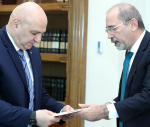You are here
Will Obama fail to move, again?
May 05,2016 - Last updated at May 05,2016
US President Barack Obama is reportedly frustrated that the American public does not see his achievements the way he does, as he was hoping to leave a “positive legacy” after his two terms at the White House.
The international public is reacting very similarly. For example, The New York Times underlined his view that “his bailouts of the economy and auto industry… prevented the Great Recession from haemorrhaging into a Great Depression“, an opinion “historians agree” to, according to the paper.
The president also pointed out that he “avoided the military misadventures of his predecessor, George W. Bush”, who sent American troops to Iraq on a very unsuccessful mission.
But he obviously overlooks his major failure, after his first visit to Cairo and later to Jerusalem, which raised hope in the Middle East and elsewhere that an Arab-Israeli peace settlement will happen and transform the entire region, to address the issue.
His reluctance to press forward to have Israelis and Palestinians reconcile remains a baffling turnabout.
If there is anything that should motivate him nowadays to proceed, once again, onwards, it should be the current reports concerning Palestinian youngsters, boys and girls, resisting Israeli aggression and yearning for justice in the Holy Land.
A recent front-page news story in The New York Times, authored by Diaa Hadid from the Israeli-occupied West Bank, revealed that the number of Palestinian prisoners under 18 more than doubled, to 430 from 170 before the stabbings, shootings and car attacks began on October 1.
“Of them, 103 were 16 or younger,” she wrote, adding: “The increase reflects Israeli crackdown on Palestinians who throw stones or otherwise confront soldiers and civilians among an outbreak of attacks in which nearly half of the suspects are teenagers.
“It has renewed a debate over how Israel’s military justice system, which prosecutes Palestinians from the West Bank, differs from the courts that cover Israeli citizens and Palestinian residents of Jerusalem, and especially how it handles very young offenders.”
“Nobody doubts what she did,” Sarit Michaeli of the Israeli human rights group B’Tselem said of 12-year-old Dima, “but if she was an Israeli child, it would be impossible under Israeli law to sentence a child this young to an actual jail term”. (Dima was sentenced to four-and-a-half month term, but only served half the time).
Most West Bank suspects are interrogated alone; they reportedly face some form of physical abuse and are not informed of their rights.
Last Thursday, another heinous act by the Israeli forces was committed: they killed two Palestinian siblings, a young pregnant Palestinian woman and her 16-year-old brother, at an Israeli military checkpoint in Ramallah where the Palestinian Authority maintains its headquarters.
Palestinian President Mahmoud Abbas denounced the silence of the international community after Israel shot the couple alleging that she threw a knife at the Israeli officer who was 20 metres away.
The recent violence has left over 200 Palestinians dead.
More abuse of the Palestinians in the occupied West Bank was revealed last week, when a fourfold increase from last year in the rate of Israeli demolitions of Palestinian houses and structures was reported, which left a record-high 808 Palestinian displaced since the start of the year.
According to UN documents, the Israeli occupation authorities destroyed some 585 Palestinian structures across the occupied Palestinian territory since January.
All eyes are, meanwhile, focused on the upcoming French-sponsored international conference on the two-state solution, set to start on May 30.
It will be the first concrete step to revive the Palestinian-Israeli peace process since the failed shuttle diplomacy launched by US Secretary of State John Kerry in 2013.
Interestingly, neither the Palestinians nor the Israelis are invited to the meeting for fear that the Israelis will boycott the event.
They actually announced their boycott of the session.
In most views, Israel is not seen as a serious negotiator since Israeli Prime Minister Benjamin Netanyahu has shunned any face-to-face meeting with the Palestinian leaders. The participants in the talks include the so-called Middle East Quartet — the US, the EU, Russia and the United Nations — and the 22-member Arab League.
If successful, an international peace conference will be launched later this summer.
The focus of this international meeting is likely to be on Obama, who may still be hesitant to make any serious move because of the upcoming US elections.
The writer is a Washington-based columnist.












